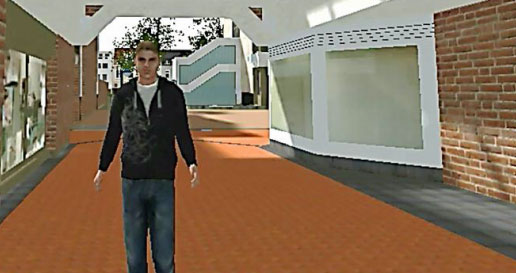The benefits of reading others are well documented, Hahn said. Taking in social perspective helps people become less ego-centric, decreases use of stereotypes, increases perspectives of similarity, and diminishes social aggression. These effects could make a big impact on many classrooms where the success of the lesson can hinge on how well a teacher is able to interact with the students. “It becomes much easier to empathize and leads to benefits in relationships and ultimately educational outcomes for kids,” Hahn said.
In an effort to create an experience that will help build these types of positive relationships through nuanced social perspective, Hahn’s team used a video game simulation to give participants the experience of “walking in another’s shoes.”
[RELATED READING: Empathy: the Key to Social and Emotional Learning]
The scenario involves a confrontation between a park ranger and a golf course owner who share land, but disagree over how to use it. The simulation allows a participant to play the role of the golf course owner, walking around in his world, talking to his colleagues and getting a sense for his perspective and opinions about the world. The player then has the same experience walking in the shoes of the park ranger. Finally, the player is asked to negotiate from the perspective of the golf course owner with the park ranger over various differences of opinion related to how the land should be treated. Each of the points of negotiation had a money value attached, giving the player a stake in the outcome of the negotiations.
“There was a pretty large positive effect from walking in the shoes of the ranger and we seemed to get down to what caused this to happen,” said Geoff Marietta, another doctoral candidate on the research team. Participants were more likely to compromise in the negotiations resulting in positive relationship building between the golf course owner and the park ranger. “What caused the effect on the relationship was really enhanced social perspective taking and people perceiving greater behavioral similarity,” Marietta said.
The researchers also experimented with giving participants written information about the park ranger’s perspective, but that didn’t improve willingness to compromise or negotiate. When they gave participants a detailed transcript, however, they were able to achieve negotiation results and positive relationship building similar to those of participants who walked in the virtual shoes of the park ranger.
“This has great potential to use virtual environments to improve interpersonal relationships that are not possible in the real world, to actually walk in the shoes of another party,” said Marietta. So far researchers have tested the game on adults and a few middle school students, but they are looking for more test subjects.
The researchers used a virtual world created in Unity, a web-based application that could be easily used in schools. They’d like to build out a virtual school so that students could interact with peers and teachers in different ways, helping them gain skills in social perspective taking that would allow them to build positive relationships within a school context, hopefully leading to greater academic and social success.
The research team sees the technique as widely applicable since communication and negotiation can so easily break down in any context. Teacher training, language development and management training could all benefit from the ability to understand the perspective of another. Researchers also hypothesize the technique could work well with bullies.


